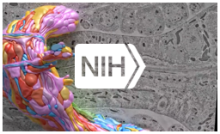
The fifth annual BRAIN Initiative Investigators Meeting, held from April 11-13, 2019 in Washington, DC, convened approximately 1600 registrants. In tandem, the Advisory Committee to the NIH Director BRAIN Initiative Working Group 2.0 previewed and has now released their draft report, which is open for public comment through May 15, 2019.
From April 11-13, 2019, the Wardman Park Marriott in Washington, DC, hosted the fifth annual BRAIN Initiative Investigators Meeting. The meeting convened approximately 1600 registrants, including BRAIN Initiative awardees, staff, and leadership from the contributing federal agencies (NIH, NSF, DARPA, IARPA, and FDA), as well as representatives and investigators from participating non-federal organizations, members of the media, public, and Congress.
This year’s meeting featured plenary sessions from: Dr. Paola Arlotta (Harvard University), Dr. Patricia Churchland (University of California), Dr. Marcus Meister (California Institute of Technology), and Dr. Edvard Moser (Kavli Institute for Neuroscience). On the first day of the meeting, the NIH Advisory Council to the Director (ACD) BRAIN Initiative Working Group 2.0 and BRAIN Neuroethics Subgroup held a Town Hall, moderated by NIH Director, Dr. Francis Collins. There, the co-chairs of both groups – Drs. Catherine Dulac, John Maunsell, Jim Eberwine, and Jeff Kahn – previewed the findings of their draft report on how best to accomplish the ambitious vision for the BRAIN Initiative, considering the current state of neuroscience. The Working Group’s draft report is now available for public comment via a Request for Information, with the BRAIN Neuroethics Subgroup’s Roadmap being released later this month for public comment. All of the plenary sessions, as well as the Town Hall, were videocast, archived, and are available for streaming on the NIH Videocast website.
For the first time this year, attendee-organized symposia highlighted emerging areas of focus in BRAIN. Some of these topics included: Bridging Animal and Human Brain Research with fMRI, Emerging Technologies in Studying Spinal Cord Circuitry and Dynamics, Advances in Mapping Neural Connectivity, and Neuropharmacology at the Age of the BRAIN Cell-Census. Along with these symposia, Research Highlight Talks provided platforms for BRAIN Initiative awardees to discuss their latest scientific advances. Additionally, Focused Sessions provided forum opportunities for those interested in specialized topics, such as the BRAIN Initiative Informatics Infrastructure and Frontiers of Non-Invasive Brain Imaging. A session on neuroethics featured active collaborations between neuroscientists and neuroethicists, including one on the neuroethical implications of portable magnetic resonance imaging (MRI). For more information, see this coverage from Science Magazine.
The 2019 Meeting also featured a three-part science communications series. On Thursday, April 11, NPR’s Jon Hamilton presented a workshop on talking to the public about BRAIN science to a packed room. On Friday, April 12, Betsy Stark, an Emmy Award winning journalist and former ABC News Business Correspondent, led a workshop on talking to the media about BRAIN science. Finally, on Saturday, April 13, Rohan Verma, Vice President at Ogilvy Public Relations Worldwide, led a workshop on using social media to promote BRAIN science.
We look forward to seeing everyone at the sixth annual BRAIN Initiative Investigators Meeting in 2020!
